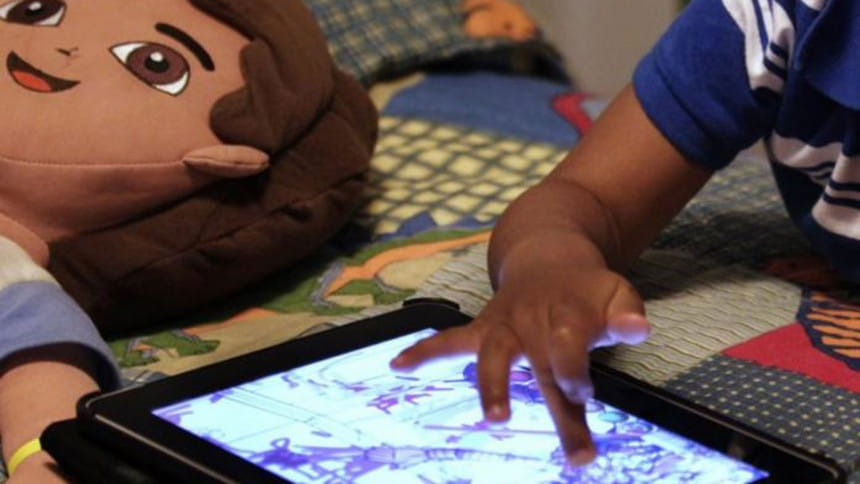Children need less screen time and more active play

In August 2020, a Bangladeshi television channel aired a news story on the excessive use of smartphone use by children under the age of 5, and its negative consequences. Many of them are having severe problems with their eyesight, and in some cases, are developing the ability to speak later than normal.
In Bangladesh, many parents use smartphones to make children eat. During that time, the children passively watch the screen. It is also quite common to observe that parents and children are together in a restaurant or any other public place, but there is hardly any interaction—both are busy looking at their screens. These are just a few examples of smartphone addiction. Raising children is the responsibility of parents. We cannot expect smartphones to do it, right?
Many parents complain about the excessive screen time of their children. But who is responsible for developing this habit? If parents let children use smartphones, then they also have to set a limit on using then.
A World Health Organization's panel of experts issued guidelines on the physical activity, sedentary behaviour and sleep for children under 5 years of age in 2019, which emphasised that children must spend less time sitting and watching screens, or restrained in prams and seats. They should also get better quality sleep and have more time for active play if they are to grow up healthy. Quality sedentary time spent on interactive non-screen-based activities with a caregiver (e.g., reading, storytelling, singing and solving puzzles) is very important for child development.
Failure to meet current physical activity recommendations is responsible for more than 5 million deaths globally each year across all age groups. Currently, over 23 percent of adults and 80 percent of adolescents are not sufficiently physically active. Establishing healthy habits early in life contributes to developing good habits through childhood, adolescence and into adulthood.
"What we really need to do is bring back play for children. This is about making the shift from sedentary time to playtime, while protecting sleep," said Dr Juana Willumsen, WHO focal point for childhood obesity and physical activity. While the WHO guidelines are for children under 5 years, sedentary lifestyle is detrimental for all children.
It is concerning that most parents in Bangladesh are not even aware of the negative impacts of excessive screen time and sedentary lifestyle on children's development. They need to realise the seriousness of the issue and take initiatives to reduce the harm before it is too late. There should also be awareness of the fact that passive screen time is harmful. If parents or adult caregivers interact with children while they are watching something on the screen, then that provides stimulation and also facilitates learning.
In some western countries, efforts have been made on limiting the screen time of children for quite some time. But now there is a growing realisation that adults also need to make sure they are not glued to their phones and are prioritising one-on-one time without the use of gadgets. Many children are entering school without sufficient levels of communication skills. This is due to the limited stimulation they receive from their parents in the home environment—as the parents are busy with their smartphones and do not spend adequate time talking, reading stories, or playing with their children. Parental screen time can reduce face-to-face interaction that is vital for children's emotional and intellectual development.
In an article published inJAMA Pediatrics (2018), Dr Jenny Radesky (University of Michigan) and Dr Megan Moreno (University of Wisconsin School of Medicine and Public Health in Madison) suggested that children learn smartphone habits from their parents. Parents should prioritise mealtimes, bedtimes and specific downtimes for family members to unplug and perform tasks together. They have to resist the urge to document everything.
While mobile technologies have certainly made some things easier, they create more demands on parents than they had before: more emails, more feeds to check, more games to play, etc. When parents are engaging with their smartphones, they talk less to their children, respond slower and without paying much attention, and overreact in response to these interruptions. In the long run, this may lead to more parenting stress and damage parent-child relationship.
Parents must limit their own screen time, as children follow what parents do, not what they say. They should spend quality time with their children, where children get uninterrupted attention. Parents have to make their children interested in various outdoor activities. Parents should provide guidance in developing children's capacity so that they learn to use technology for their own benefits. This should happen before they become addicted to it; as unlearning something becomes very difficult once it becomes a habit.
Instead of losing track of time, parents have to notice how much time has passed when checking their email or social media. When parents use smartphones for shared enjoyment with their children, or to get things done faster so they can return to family time, smartphones could be a positive force. If used wisely and optimally, technology could enhance the quality of parental interactions with children.
While parents have to be very thoughtful in developing proper screen time habit for themselves and their children, it is the responsibility of the state to ensure that there are sufficient playgrounds for children, and they have opportunities to engage in extra-curricular activities. Healthy development of children should be one of the highest priorities for any country, and there must be sufficient investment for that. Unfortunately, we have lost most of our playgrounds and there has been a decline in sports and cultural activities that were available at the community level. This must be reversed. Cultural organisations should also come forward to engage with children and young people.
Excessive and passive screen time for children should be a concern for all of us. Are we concerned enough and performing our responsibilities to address this, so that children grow-up properly to realise their full potential?
Laila Khondkar is an international development worker.

 For all latest news, follow The Daily Star's Google News channel.
For all latest news, follow The Daily Star's Google News channel. 



Comments